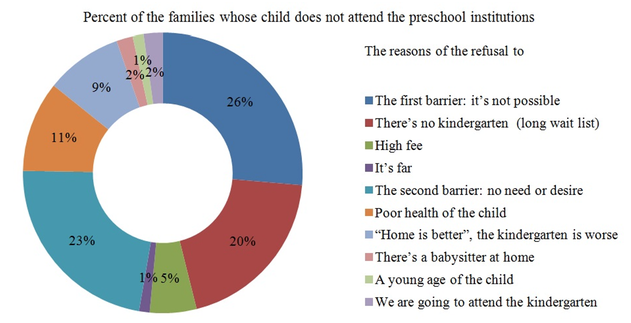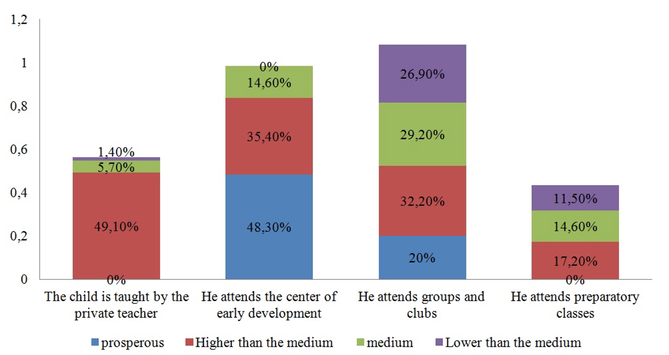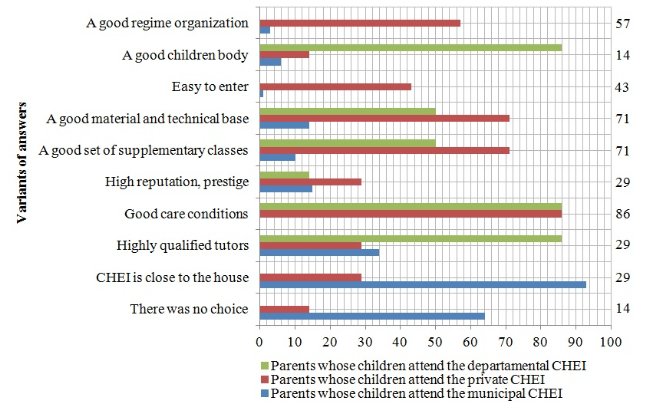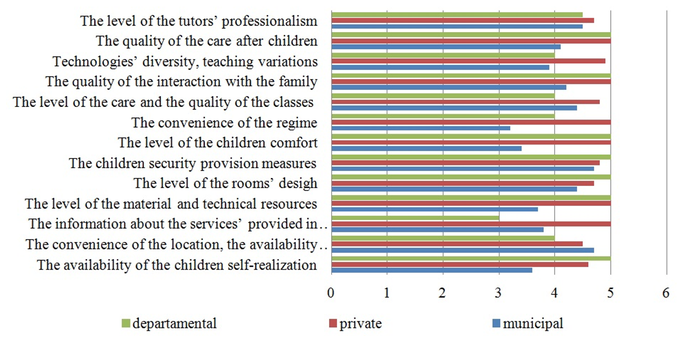

 Vol. 39 (Number 38) Year 2018. Page 2
Vol. 39 (Number 38) Year 2018. Page 2
Lyutsiya Mugtabarovna GAISINA 1; Yuri Nikolaevich DOROZHKIN 2; Svetlana Gennad'evna RESHETOVA 3; Iuliia Viktorovna RASULEVA 4; Flura Rishatovna IMAMUTDINOVA 5; Dina Flyurovna KHAFIZOVA 6
Received: 13/04/2018 • Approved: 01/06/2018
ABSTRACT: In the article the current practice of the preschool educational institutions in the Republic of Bashkortostan of the Russian Federation are being studied. The parents’ strategies in the choice of the preschool institutions by the property form (municipal, private, departamental) are being considered. The idea of the paper is based on the institutional approach provisions; for the creation of the explanatory scheme of the preschool education effectiveness the functional analysis methodologies have been applied. This is due to the fact that the preschool educational system institutes simultaneously act as the economic, the social and the legal things. The respondents of the sociological studies were the parents (the legal representatives) of the preschool educational institutions’ pupils of the city region of the c. of Ufa of the Republic of Bashkortostan as well as the parents whose children did not attend the preschool educational institutions. The results of this study are the situation analysis stage of the institutional development of the preschool educational institutions in the Republic of Bashkortostan that show that the preschool educational sector has a wide range of problems that impedes the successful realization of its functions and wants the solutions both on the regional level and the municipal one. We believe that a constructive solution of these problems is possible only with the participation of all the preschool education subjects, the parents representing their children interest among them. |
RESUMEN: En el artículo se estudia la práctica actual de las instituciones educativas preescolares en la República de Bashkortostán de la Federación de Rusia. Se están considerando las estrategias de los padres en la elección de las instituciones preescolares por el formulario de propiedad (municipal, privado, departamental). La idea del documento se basa en las disposiciones de enfoque institucional; para la creación del esquema explicativo de la efectividad de la educación preescolar se han aplicado las metodologías de análisis funcional. Esto se debe a que los institutos del sistema educativo preescolar actúan simultáneamente como lo económico, lo social y lo legal. Los encuestados de los estudios sociológicos fueron los padres (los representantes legales) de los alumnos de las instituciones educativas preescolares de la región de la ciudad de la c. de Ufa de la República de Bashkortostán, así como a los padres cuyos hijos no asistieron a las instituciones educativas preescolares. Los resultados de este estudio son la etapa de análisis de la situación del desarrollo institucional de las instituciones educativas preescolares en la República de Bashkortostán que muestran que el sector educativo preescolar tiene una amplia gama de problemas que dificulta la realización exitosa de sus funciones y quiere soluciones tanto en el nivel regional y el municipal. Creemos que una solución constructiva de estos problemas es posible solo con la participación de todas las materias de educación preescolar, los padres representan el interés de sus hijos entre ellos. |
Today the preschool education experiences the revival both in the social policy and the sociological studies’ problems, generating the discussions about the institutional aspects of the preschool education sector development (Bakhtizin, et al., 2016). The foreign investigators view the preschool education as a part of the governmental social policy and actualize its contribution into the social mobility provision, the social justice and the gender equality in the family (Schiwe and Willekens, 2009). Not so numerous, to our mind, domestic studies, deal with the economy and the accessibility of the preschool education (Gokhberg, 2016; Savitskaya, 2005; Seliverstova, 2008), the parents’ demand specifics (Politics, 2010; 2011; Sukhova, 2011; Sobkin, 2013) and some aspects of the preschool childhood sociology (Mitrofanova, 2004; Poddubnaya, 2005; Savinskaya, 2011; Filipova, 2016; Scheglova, 1996).
At present the main legal document specifying the general principles and vectors of the preschool education development is the Federal law “About the education in the Russian Federation” from 29. 12. 2012 № 273-FL (Official internet-portal of the legal information, 30.12.2012). It’s notable that the Law makes an attempt to more systematically expose the legislator’s view upon the mission and the tasks of the preschool education system that implies broadening its institutional forms, the introduction of non-governmental sector to the solution of the governmental problems (a private kindergarten, a home kindergarten, the childhood development a centre).
We may respond that in connection with the above-mentioned innovations there a range of problems and contradictions in the existing practice of the preschool education institutions (Gaisina, Mikhaylovskaya, et al., 2015; Gaisina, et al., 2017). These problematic zones may become the reason of the parents’ protest behavior dissatisfied with the current preschool education condition in the Russian Federation regions.
A part of the empirical sociological study realized by the authors included the questionnaire poll, the parents’ society being its object, whose children attend the preschool educational institutions of the municipal of the general development type, the private kindergartens and the departamental ones (n=117) of the c. of Ufa of the Republic of Bashkortostan in the frames of a multi-stage stratified selection;conducting a formal interview with the parents whose children do not attend the kindergarten (n=200). From our viewpoint the diversity of the organizational forms in the private sector of the educational services for the preschool children and their parents is widely represented by the individual practice and the “development centers” rather than by the classical kindergartens. That’s why a strict reference of the new organizational structures in the private sector became possible only after their juridical legalization into such a form as a kindergarten.
As a hypothesis we offer mutually complementary suggestions. First, the differentiation of the preschool organizations by the property forms arises the social inequality of the children chances of getting the preschool educational services; second, the factors acting on the macro level (the accessibility, the number and the quality of the provided services and the material base) and the micro level (the level of the family well being, the child health) produce an impact upon the parents’ strategy.
A child in the contemporary Russian society needs a special care and a private world as the urgent conditions for a successful socialization (Rossiiskaia Gazeta, 2013). Respectively, the ideology of the institutions linked with the preschool childhood presents the necessity of the creation of a specific zone characterized by the care and confidence.
First of all let’s turn to the parents’ strategies whose children do not attend the preschool institutions. The peculiarities of an understandablemotivation of the parents for not attending the preschool institutions (Figure 1) allow specifying the conformity of the subjective intentions of the services’ consumers to the objective aiming at its realization (inner worth) (Reshetova, 2015).
Figure 1
The distribution of the answers in the course of the formalized interview
to the question: “Why doesn’t your child attend the kindergarten?”

The data of Figure 1 vividly show that the change of the conditions which make the parents leave their children at home, the majority will chose such or another form of the public preschool education. In this case one of the most important functions of the preschool education is solved, namely, socialization.
The choice of the parents’ majority who need the collective preschool educational institutions’ services depends on:
The availability of the opportunity of getting the preschool services;
On the fact of how appropriate the services offered by the preschool educational institutions are according to their needs (the form of bringing up and teaching of the child). It appeared that 10% of the parents noted that “they took their child to the private kindergarten, but had to reject this because of high fees”.
Let’s turn to the problem justice of the sayings about the high fees of the supplementary educational services in the preschool educational institutions (Figure 2).
Figure 2
The correlation of the parents’ material well being and the demand
for the supplementary services of the preschool institutions

The data presented show that a high fee level of the supplementary services is the reason of inequality in getting the preschool education and according to the study data, close the access to them for the families with a low income.
Thus, the specificity of the institutional education formed reflects the problematic zones in the Republic of Bashkortostan and puts the path of the prospective development. The leading positions are taken by the “hypertrophied inequality: the direct inequality as the absence of the opportunity of getting the preschool education institutional services as well as the relative inequality as the lack of the access to the preschool of the desired quality.
The interrelations of the preschool education social institute with the parents presuppose the parents’ contract with the preschool institution that allows delegating the part of their functions on the children nursing and care. Thus, we suppose that the preschool educational institutions differ in the specificity of the parents’ demand by their property forms-the municipal, the private, the departamental. As a result of the analysis (Reshetova, 2016) we may differentiate 3 groups of factors which influence upon the parents’ choice of the preschool educational institutions:
-territorial accessibility;
-the quality of the services and the care conditions in the kindergarten;
-the tutor’s professionalism.
The analysis the parents’ demand distribution for the services dependent on the property form of the kindergarten (the municipal, the private, the departamental) have been presented on Figure 3.
Figure 3
The structure of the choice criteria of the kindergarten dependent
on the property form of the preschool educational institutions

The comparison of the above-mentioned data is the basis for the following conclusions.
Themunicipal preschool institutions as a rule are territorially more accessible and cheaper in the services’ payment and have no alternative for the low income families. The latter may be explained by the fact that the passes are distributed in the regional education department where the family lives. Among the private preschool institutions’ advantages are: a small number of children in the group, a large set of supplementary classes and a high quality of the provided sercices, a modern material and technical base. The strong points of thedepartamental preschool educational institutions consist in the proximity to the parents’ job and the conformity with their schedule.
Thus, the parents’ choice of the kindergarten depends both on the municipal support level created by the executive bodies and the family resource provision level (the material well being, self-occupation of the woman/mother).
Turning to the question: “How far is your kindergarten from your working place?” made it possible to specify the factors determining the parents’ strategies formation in the choice of the preschool institutions. The answers received testify the fact that 62,1 % of the children attending the municipal preschool institutions live close to the kindergarten. A considerable part (33,8%) state that their kindergarten is relatively close to the place of residence and there are no difficulties in transporting the child there. The situation is complicated with the parents who got the pass far from their house – their number is 4,1%. However, the number of the parents whose children attend a private kindergarten was 41,2%, that is confirmed by table 2 data, where the correlation of the parents’ material well being and the demand for the alternative preschool educational services’ forms is reflected. The parents whose children attend a departamental preschool institutions, mark the variant “another” in the answer, interpreting the answer as the proximity to the working place and the conformity of the working schedule of the parents and the kindergarten (Abankina, et al., 2011a; 2011b).
Taking into consideration the answers’ distribution we make a conclusion that the majority of the parents first of all rely upon the municipal government support in the preschool institutions’ development (macro level), while the family material well being level only reinforces the parents’ strategies (micro level).
The opinions of the parents being polled about the current kindergarten practice effectiveness were interesting for us (Figure 4).
Figure 4
The assessment of the services’ quality parameters
in the preschool educational institutions

The results of the studies have shown that a special attention must be paid to the poor conditions’ problem for the health- improvement regimes in the private preschool institutions (this problem was marked by 87% of the parents).
In its turn in the municipal preschool institutions of Ufa the occupancy rate problem (46%) has been outlined; the difficulties in the child adaptation (38%) and the possibility of taking the child to a definite kindergarten (34%).
The results of the studies are the initial stage for the situation analysis of the institutional development of the preschool institutions in the Republic of Bashkortostan. Alongside with this they point out the main problems in this branch.
On the macro level the current practice of the preschool institutions are specified by the problems of the “hypertrophied inequality in the preschool education provision. On the micro level the problems are differentiated in the parents’ assessment depending on the organizational legal forms of the preschool educational institutions keeping in mind the fact that the parents are targeted on the local authority support of the municipal preschool institutions or the market regulation. Thus, the territorial location and the absence of the alternative determine the choice of the municipal preschool institutions; a low groups’ occupancy rate, a good set of supplementary classes, the absence of the difficulties to enter are the arguments in favor of a private kindergarten choice. The limited number of the departamental preschool institutions first of all testifies the fact that the number of the enterprises economically able to maintain the kindergartens in their asset list is rather restricted. It explains the lack of access to these services for the majority of the families. To the number of the actual problems of the municipal kindergartens the parents refer: a high occupancy rate, the lack of the material technical provision, poor conditions for the child adaptation to the kindergarten; those of the private ones are poor conditions for the health-improving regimes; that of the departamental ones is the lack of the information provision (Gaisina, Bakhtizin, et al., 2015).
Abankina, I.B., Savelyeva, M.B. and Sigalov, S.V. (2011a). The policy of the preschool educational institutions on the poll results of their managers, 2010. Information bulletin “The education economics monitoring” No. 3(50). Moscow: NIU VSHE.
Abankina, I.B., Savelyeva, M.B. and Sigalov, S.V. (2011b). The policy of the preschool educational institutions on the poll results of their managers, 2010. Information bulletin “The education economics monitoring” No. 5(52). Moscow: NIU VSHE.
Bakhtizin, R., Gaisina, L., Ignatova, Y., Sagitov, S. and Ustinova, O. (2016). Polysubjective approach to the management of the higher education system of the state: the experience of Kazakhstan. International Journal of Environmental and Science Education, 11(9), 2699-2710.
Filipova, A.G. (2016). The Russian childhood sociology: yesterday, today, tomorrow. The institutionalization problems and the development problems. SPb: Asterion.
Gokhberg, L.M. (2016). Indicators of the education: 2016: statistical collection. M.: NIU VSHE.
Gaisina, L.M., Bakhtizin, R.N., Mikhaylovskaya, I.M., Khairullina, N.G. and Belonozhko, M.L. (2015). Social technologies as an instrument for the modernization of social space in the social and labor sphere. Biosciences Biotechnology Research Asia, 12(3), 2947-2958.
Gaisina, L.M., Mikhaylovskaya, I.M., Khairullina, N.G., Ustinova, O.V. and Shakirova, E.V. (2015). The role of the media in the spiritual and moral evolution of society. Mediterranean Journal of Social Sciences, 6(5)S2, 93-101.
Gaisina, L.M., Barbakov, O.M., Koltunova, Yu.I., Shakirova, E.V. and Kostyleva, E.G. (2017). Social management systems’ modeling based on the synergetic approach: methods and fundamentals of implementation. Academy of Strategic Management Journal, 16(1), 82-94.
Mitrofanova, S.Yu. (2004). The social status of childhood: the life style approach: thesis of cand. of sociologic science. Saratov: Saratov State Technical University.
Official internet-portal of the legal information. (30.12.2012). Retrieved from http://www.pravo.gov.ru.
Poddubnaya, T.N. (2005). The management of the childhood social protection system. Rostov on Don: Fenix.
Reshetova, S.G. (2015). The specificity of the preschool children specialization in the mirror of the historic knowledge. Global scientific potential, 1(46), 50-55.
Reshetova, S.G. (2016). Institutional of the preschool educational institutions in contemporary Russia. Discussion, 4(67), 118-125.
Rossiiskaia Gazeta [Ros. Gaz.] 25.11.2013, No. 265 (Russ.).
Savinskaya, O.B. (2011). Care after the working women muscovites’ children. SOTSIS, 1, 137-142.
Savitskaya, E.V. (2005). Children’s preschool education: the economic aspect: information bulletin. Moscow: GU-VSHE.
Seliverstova, I.V. (2008). The inclusion of the children into the preschool education: the level, the interregional differentiation and its reasons. The problems of the education, 3, 10.
Sobkin, V.S. (2013). The sociology of the preschool childhood. Works on the education sociology. Moscow: The institute of the education sociology of RAO.
Sukhova, A.S. (2011). Services on the children care: the scope and the factors of consumption by the Russian families. The Journal of the social policy study, 4, 473-494.
Scheglova, S.N. (1996). Childhood sociology. Moscow: Socium.
Schiwe, K. and Willekens, H. (2009). Child care and preschool development in Europe: Institutional Perspectives. Basingstoke: Palgrave Macmillan.
1. Ufa State Petroleum Technological University, Russia, Republic of Bashkortostan, 450062, Ufa, Kosmonavtov Str., 1. E-mail: glmug@mail.ru
2. Ufa State Petroleum Technological University, Russia, Republic of Bashkortostan, 450062, Ufa, Kosmonavtov Str., 1. E-mail: dorword@mail.ru
3. Ufa State Petroleum Technological University, Russia, Republic of Bashkortostan, 450062, Ufa, Kosmonavtov Str., 1. E-mail: reshetovasv@mail.ru
4. Ufa State Petroleum Technological University, Russia, Republic of Bashkortostan, 450062, Ufa, Kosmonavtov Str., 1. E-mail: Schemaju@gmail.com
5. Ufa State Petroleum Technological University, Russia, Republic of Bashkortostan, 450062, Ufa, Kosmonavtov Str., 1. E-mail: ufa_kafenglish@mail.ru
6. Ufa State Petroleum Technological University, Russia, Republic of Bashkortostan, 450062, Ufa, Kosmonavtov Str., 1. E-mail: Hafizovfm@mail.ru